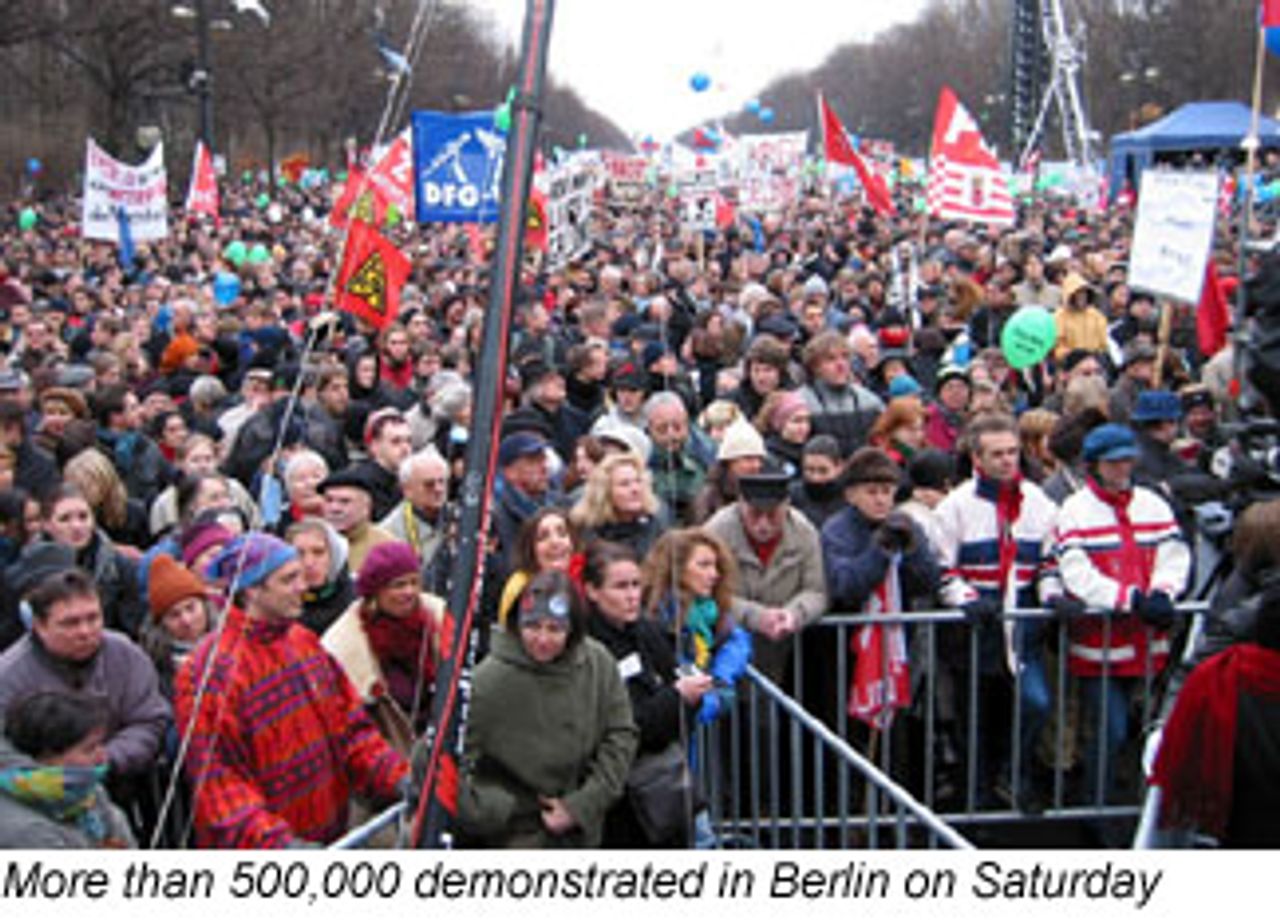According to official police figures, which generally underestimate the size of such demonstrations, more than a half million people gathered in Berlin on Saturday for the main protest in Germany against a war on Iraq. Demonstrators assembled in both the east and west of the city, and because of the huge numbers in attendance, the marches were forced to leave for the central rally earlier than planned. In the early afternoon the entire centre of Berlin, on both sides of the historic Brandenburg Gate, was teeming with protesters.

The demonstration was double the size of what was formerly the largest post-war demonstration in Germany—1983, when 250,000 gathered in Bonn to protest the decision by NATO to station American nuclear missiles on German territory.
Prominent on Saturday’s demonstration were families with children. Tens of thousands of students and school children mingled with workers carrying trade union banners. Protesters, including entire classes of school students, travelled to Berlin from all over the country in 750 buses and specially hired trains. There were also many elderly participants.
Overall, the demonstration reflected the broad social opposition in Germany to an Iraq war.
Banners proclaimed one of the main slogans of the march, “No Blood for Oil,” as well as “Old Europe is demonstrating,” a reference to the derogatory remarks on Europe by US Secretary of Defense Donald Rumsfeld. Other banners declared, “No Bush-fire, it will spread like wildfire!” and “Heil Bush.” Many banners made a connection between the struggle against war and the growing social crisis in Germany. One such banner read, “Jobs and education instead of war and arms spending.”
Although the German government is officially opposed to war against Iraq, it drew back from associating itself with the mass protest. No member of the government spoke at any of the three rallies that were linked to the march, and banners of rank-and-file Social Democratic Party (SPD) and Green Party members were only sparsely in evidence.
German Chancellor Gerhard Schröder (SPD) had expressly requested that members of the SPD-Green coalition government not take part in the demonstration. Two Green Party ministers, Jürgen Trittin and Renate Künast, did take part however, together with the German president, Wolfgang Thierse (SPD), and another well-known social democrat, Heidemarie Wieczorek-Zeul.
The main speaker at the final rally was the chairman of the service and public sector union Ver.di, Frank Bsirske. A member of the Green Party, he began his speech with a reference to a remark by German Foreign Minister Joschka Fischer (Greens) at the recent Munich NATO conference. In response to Rumsfeld’s plea for war, Fischer responded, “Sorry, I am not convinced.” From the platform, Bsirske declared, “The reasons for the path to war are thoroughly unconvincing.”
He went on to attack the American plans for war, which he warned would “not be limited to Iraq” and could potentially involve the use of nuclear weapons. He stated that what was taking place on the international stage was nothing less than a “radical coup aimed at destroying collective security structures in favour of the open assertion of American domination.” Protest, he concluded, was entirely justified and necessary.
The WSWS and the Socialist Equality Party set up a number of information stands at the Berlin demonstration. They became the focus of considerable interest and discussion.
Unlike other leaflets circulated at the demonstration, which were limited to support for general forms of protest, the statement issued by the WSWS, which was distributed in many thousands of copies, sought to develop a political strategy for the struggle against war. Many demonstrators expressed their agreement with the call for the antiwar movement to remain independent and not be tied to the interests of the French or German governments.
Jörg, who attended the demonstration with a number of friends from North-Rhine Westphalia, told the WSWS: “When one knows that Bush’s advisors and that even members of the government are active in the oil industry, then the logic of the war becomes clear.
“I think it is important that people make their own protest against the war and not leave everything to the government. Schröder was the first government representative to speak out against the war, but perhaps he is just seeking to represent German interests.”
Bernd travelled from Hamburg in one of the special buses hired for the demonstration. He is a teacher and had taken part in the 1983 Bonn protest against the stationing of American cruise missiles in Germany. He told the WSWS: “On the one hand, I am pleased that so many have turned out. This must be even bigger than the Bonn demo. At the same time, it is depressing that such protests continue to be necessary. Governments around the world have not learned very much!
“The war is utterly unjustifiable. There is not the slightest evidence that Saddam Hussein possesses the weapons which the Americans claim he has. Bush’s determination to carry out war is radicalising people across the globe. It is not surprising that there is hostility to the Western world on the part of people in the underdeveloped countries when one examines the fanatical way in which Bush pursues his policies.
“Like many people, I am watching very carefully how the German government reacts on this issue. I have not come here today to strengthen the hand of Schröder and Fischer. After all, their support for the war in Kosovo made clear that they are not acting out of purely pacifist motives.
“I am also concerned for my students and my profession. The Gulf War cost the German people $15 billion. I am working in a school with rundown buildings, a lack of facilities and books. Where is the money going to come from for a new war? We have to act now to stop this madness. Maybe it is too late to stop the war against Iraq, but this demonstration is an important milestone to prevent any further wars.”
